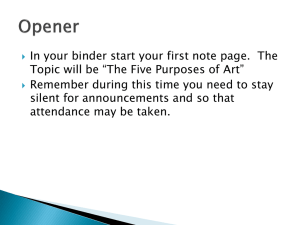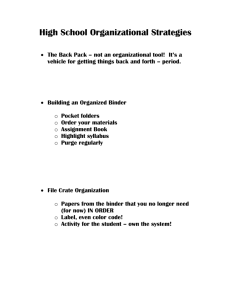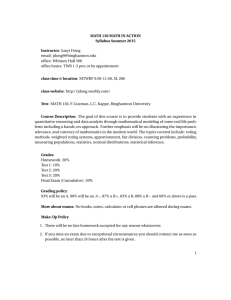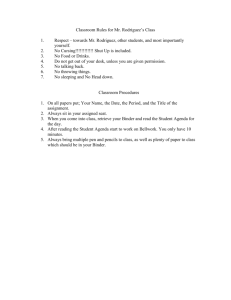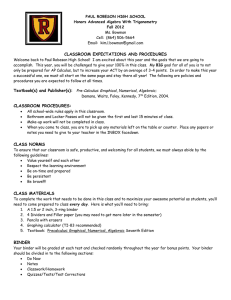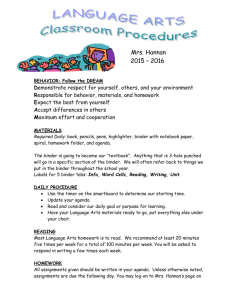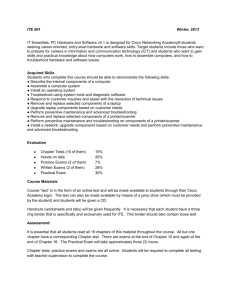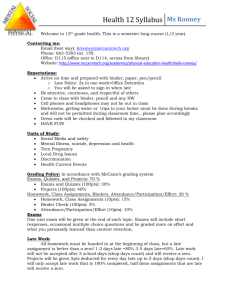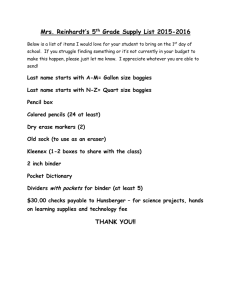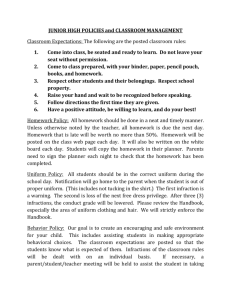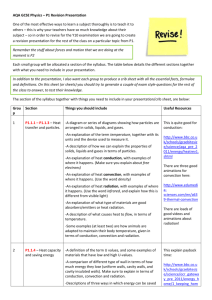Inquiry into Physics Physics 115 About This Class
advertisement
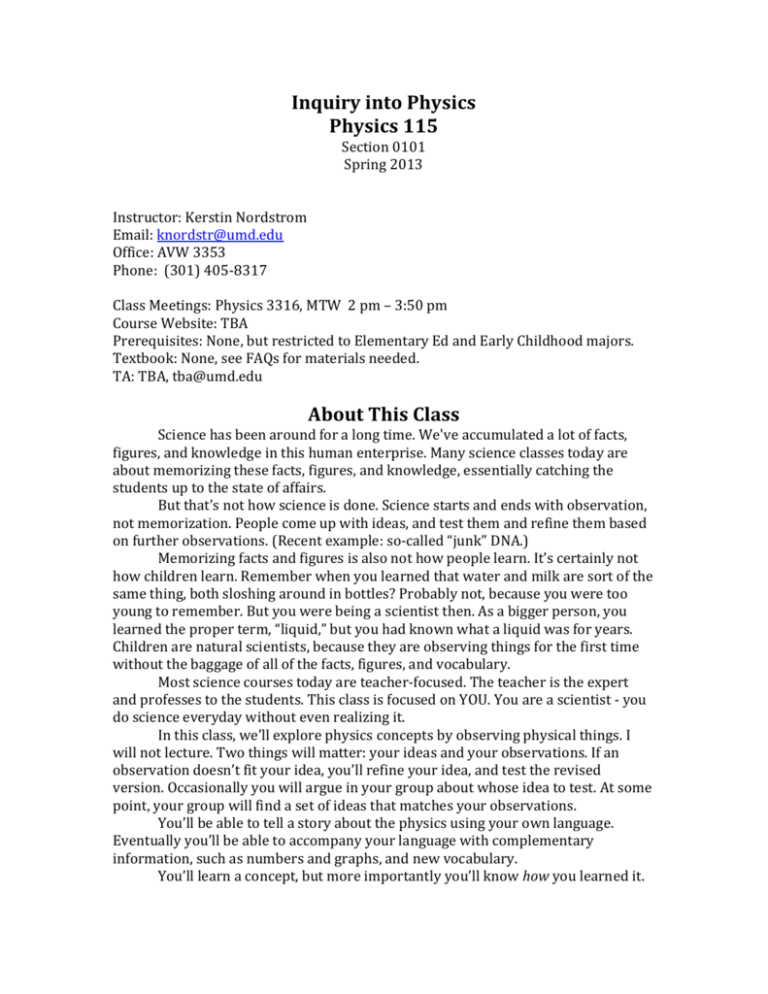
Inquiry into Physics Physics 115 Section 0101 Spring 2013 Instructor: Kerstin Nordstrom Email: knordstr@umd.edu Office: AVW 3353 Phone: (301) 405-8317 Class Meetings: Physics 3316, MTW 2 pm – 3:50 pm Course Website: TBA Prerequisites: None, but restricted to Elementary Ed and Early Childhood majors. Textbook: None, see FAQs for materials needed. TA: TBA, tba@umd.edu About This Class Science has been around for a long time. We've accumulated a lot of facts, figures, and knowledge in this human enterprise. Many science classes today are about memorizing these facts, figures, and knowledge, essentially catching the students up to the state of affairs. But that’s not how science is done. Science starts and ends with observation, not memorization. People come up with ideas, and test them and refine them based on further observations. (Recent example: so-called “junk” DNA.) Memorizing facts and figures is also not how people learn. It’s certainly not how children learn. Remember when you learned that water and milk are sort of the same thing, both sloshing around in bottles? Probably not, because you were too young to remember. But you were being a scientist then. As a bigger person, you learned the proper term, “liquid,” but you had known what a liquid was for years. Children are natural scientists, because they are observing things for the first time without the baggage of all of the facts, figures, and vocabulary. Most science courses today are teacher-focused. The teacher is the expert and professes to the students. This class is focused on YOU. You are a scientist - you do science everyday without even realizing it. In this class, we’ll explore physics concepts by observing physical things. I will not lecture. Two things will matter: your ideas and your observations. If an observation doesn’t fit your idea, you’ll refine your idea, and test the revised version. Occasionally you will argue in your group about whose idea to test. At some point, your group will find a set of ideas that matches your observations. You’ll be able to tell a story about the physics using your own language. Eventually you’ll be able to accompany your language with complementary information, such as numbers and graphs, and new vocabulary. You’ll learn a concept, but more importantly you’ll know how you learned it. What will we do in class? Each day you will be given some items and some questions about those items. You’ll observe how these items behave and interact and come up with ideas that explain this. You’ll test your ideas by further observation. Eventually, you’ll have a set of refined ideas (that you came up with yourself) about a broad range of concepts in physics. At the end of each day, I’ll ask you to write a paragraph or two of daily reflection. These will be collected and returned to you with comments, and serve as proof of class attendance. You will also be given weekly homework and an occasional exam. Exams will be “open binder.” A schedule of topics, homework, and exams is below. Dates 1/23 1/28-1/30 2/4-2/6 2/11-2/13 2/18-2/20 2/25-2/27 3/4-3/6 3/11-3/13 3/17-3/24 3/25-3/27 4/1-4/8 4/15-4/17 4/22-4/24 Topic Introduction Electricity and Magnetism – How Do Circuits Work? “ “ “ “ Matter and Energy – What’s Going On With This Stuff? “ SPRING BREAK Matter and Energy, continued “ “ 4/29-5/1 5/6-5/8 Motion and Force – How Do Things Move? “ “ 5/11-5/17 FINAL EXAMS Assigned This week! HW 1 FREE SPACE HW 2 HW 1 due M HW 3 HW 4 HW 5 No HW HW 6 HW 2 due M HW 3 due M HW 4 due M HW 5 due M Exam on 2/27 FREE SPACE HW 7 HW 6 due M HW 8 HW 9 No HW HW 7 due M HW 8 due M HW 9 due M Exam on 4/17 FREE SPACE HW 10 HW 11 HW 12 HW 10 due M HW 11 due M HW 12 due W Exam time TBA Can I meet with you? Of course! My office hours are only by appointment, but I’m usually flexible. Send me an email to schedule a meeting. What do I need for class? You will need a 3-ring binder. In this binder you will keep handouts I give, detailed notes from each lab, and occasional graph printouts. You will also keep your daily reflections and homework in the binder. I’ll occasionally collect your binder to make comments. You will only need your binder, something to write with, and yourself. We will not need to look anything up during class, we’re learning as we go. I ask you to leave all other items (including cell phones) at the front of the room or under your desk. I will do the same. How will I be graded? I urge you to avoid thinking about grades in this class. The class is not about winning; it’s about learning. I’m happy to discuss your grade in private if you are worried. I will not put grades on homework assignments or reflections, but will comment on them. A completed homework assignment will count as full credit. I may ask you to redo an assignment if I don’t feel it is complete. Some homework will require writing essays. Doing well on the homework is essential to doing well on exams, so treat it seriously. Classwork: documented by your notes, reflections, and participation Homework Exams (3) 25% 15% 20% each What if I’m absent? This is not a class where we learn facts - it is a class about the process of learning. As such it is important you be engaged in the process. If you know you will be absent for a class in advance, please email me as soon as possible. Unexcused absences happen. Unless you have proof it was beyond your control (i.e. family emergency, illness) I don't want to know the details. But due to the nature of this course, remember any absences can affect your learning and therefore your grade. After 2 unexcused absences, I will take two percentage points off of your semester grade for each further absence. What do I need to do to be successful in this class? Participation. Come in with a mindset that is curious, open, questioning, and confident. Speak up. Ideas are never wrong - they are ideas. We must test these ideas to see if they work. Academic integrity. While your group may agree upon conclusions in class, and you may study with others outside of class, it’s important that the work is your own. Indeed, this class will only be useful if you are responsible for your work. Be sure to respond to questions in your own style, using your own thoughts. What can I hope to get out of this class? -An understanding of several concepts in physics -An understanding of how you learned those concepts -An understanding of how someone else might learn any concept -Bonus prize: activity ideas for your own classroom in the future!
